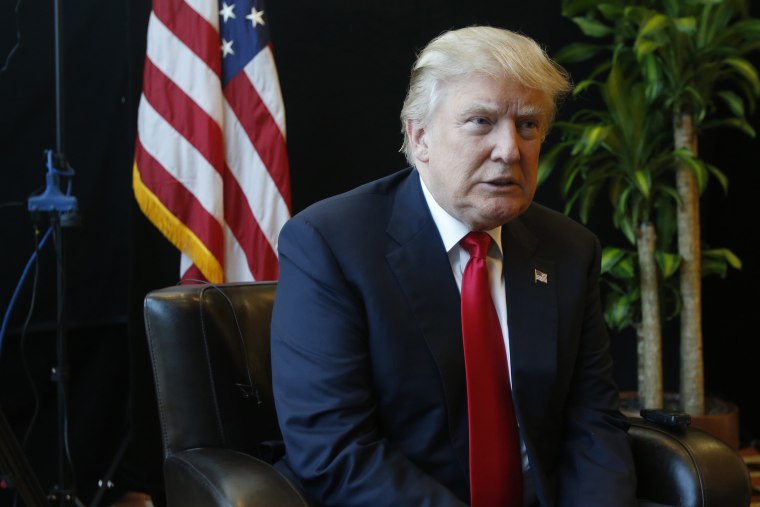For years, Republicans have been fairly consistent in their criticisms of President Obama's foreign policy. Former Gov. Jeb Bush (R-Fla.), for example, insisted last year that the president "does not believe that American power is a force for good." Senate Homeland Security Committee Chairman Ron Johnson (R-Wis.) used nearly identical language a year earlier.
Reality, of course, points in the opposite direction, and President Obama has proven repeatedly that the Republican attacks are the opposite of the truth.
But in 2016, there is a presidential hopeful who genuinely believes that the United States lacks moral authority on the international stage. After years of inexplicable anti-Obama whining, ironically, it's the Republican nominee.
Donald J. Trump, on the eve of accepting the Republican nomination for president, said Wednesday that if he were elected, he would not pressure Turkey or other authoritarian allies about conducting purges of their political adversaries or cracking down on civil liberties. The United States, he said, has to "fix our own mess" before trying to alter the behavior of other nations. "I don't think we have a right to lecture," Mr. Trump said in a wide-ranging interview in his suite in a downtown hotel here while keeping an eye on television broadcasts from the Republican National Convention.
When the New York Times asked if he'd honor the NATO treaty, and defend allied nations if attacked, Trump balked -- saying he'd check first to see if he's satisfied with their contributions to the alliance.
Last night, Republican vice presidential nominee Mike Pence assured the nation that a President Trump would "stand with our allies." This came just hours after Trump himself told the New York Times that he's prepared not to stand with our allies.
I can relate to those who tire of hearing reporters, pundits, and commentators like me characterize various campaign developments as wildly important, game-changing moments, which are soon after forgotten. But this isn't hyperbole: Trump's interview with the Times should change the nature of the 2016 presidential campaign. He's articulating a perspective Americans have never before heard from a major-party presidential nominee.
In the American tradition, there have been plenty of isolationists, who believe it's in our interests -- and perhaps even the world's interests -- to withdraw and turn inward.
But that's not what Trump is articulating. Rather, Donald J. Trump is saying the United States lacks the moral authority to lead. As far as he's concerned, we're just not a good enough country to command respect abroad. America could maintain a role as an international leader, but the GOP candidate believes we shouldn't because we haven't earned it.
"When the world looks at how bad the United States is, and then we go and talk about civil liberties, I don't think we're a very good messenger," he said. Trump added, "I don't know that we have a right to lecture. Just look about what's happening with our country. How are we going to lecture when people are shooting our policemen in cold blood?"
"When the world looks at how bad the United States is." Try to think of the last time a would-be president talked this way about his or her own country.
What's the difference between Trump's perspective and that of anti-American foreign leader? For all intents and purposes, there is no difference.
Ronald Reagan is known for having said the United States is a "shining city on a hill," offering a beacon of light to people around the globe. A generation later, a new Republican has a new message, effectively declaring, "Actually, we stink."
Try to imagine what would happen in American politics if a Democrat declared that the United States lacks the moral authority to lead. Is there any doubt that the Democrat's career would be immediately finished? And yet, here we are in 2016, with the Republican Party -- which used to consider credibility on foreign policy as its birthright -- nominating Trump for president anyway.
Of course, there's a broader context to all of this. Trump is trashing NATO, which is what Russia's Vladimir Putin wants to see; Trump is balking at support for U.S. allies abroad, which is what Russia's Vladimir Putin wants to see; and Trump is publicly trashing America's moral authority, which is what Russia's Vladimir Putin wants to see.
I wrote a piece yesterday on Trump's unnerving ties to the Russian autocrat, and the questions raised by the relationship. Given the Republican's comments to the New York Times, those questions are even more deserving of an answer.
The Atlantic's Jeffrey Goldberg, who noted that President Obama "has never spoken as negatively about America as Donald Trump has," published an important piece overnight.
"Trump is making it clear that, as president, he would allow Russia to advance its hegemonic interests across Europe and the Middle East," Goldberg wrote, adding, "Donald Trump, should he be elected president, would bring an end to the postwar international order, and liberate dictators, first and foremost his ally Vladimir Putin, to advance their own interests..... We are truly in uncharted waters."
I realize that for much of the political world, Hillary Clinton's email protocols are the single most important issue of the presidential campaign. This morning, I hope the political world will read Trump's interview and reconsider those assumptions.
